British prime minister David Cameron is gearing up to fight the toughest campaign of his life to win reelection on May 7.![]()
Nevertheless, his announcement earlier this week that he intends to serve out two terms — and no more — has started the race to determine his successor. Despite Cameron’s efforts to signal that he will step down in 2020, there’s no guarantee that Cameron will be so lucky. The next Conservative Party leadership race could start immediately after the British election if Cameron leads the party to defeat or, possibly, after 2017 when Cameron has pledged (if reelected) to hold a referendum on continuing the United Kingdom’s membership in the European Union.
But even if the Tories win a renewed mandate (an outcome that seems more likely today than at any time in the past two or three years), a second Cameron term will now become even more consumed by the debate among his would-be successors to define the party’s future. Notwithstanding the planned 2017 EU referendum, the party’s next leader will determine whether the Conservatives should be relatively more pro-Europe or anti-Europe in an era that features the rise Nigel Farage’s populist and eurosceptic UK Independence Party (UKIP). The next Tory leader will also face a fragmenting political environment that appears to be transitioning from a two-party to a multi-party system and a growing sense of constitutional crisis in the aftermath of last September’s referendum on Scottish independence. Moreover, the next Tory leader will also have to choose between two strains of economic policy — a pro-market Thatcherite approach or the more centrist ‘one nation’ Tory approach of her predecessors that concedes a stronger role for government social welfare.
Obviously, a lot depends on timing — a leadership contest in 2015 could bring a different result than a contest in 2017 or 2019.
Cameron, in his remarks earlier this week, singled out Johnson as well as chancellor George Osborne and home secretary Theresa May as particularly strong candidates. Though Cameron almost certainly prefers Osborne, whose leadership stock is certainly on the rise as the economy improves, the two frontrunners today are clearly Johnson and May (pictured together above), whose personalities and approach to politics and government couldn’t be more different.
Here’s a look at what Johnson, May, Osborne would bring to the leadership — along with four other potential candidates waiting in the wings.
Boris Johnson
London mayor
For now, the bookies’ favorite is clearly London mayor Boris Johnson (pictured above), who won improbable victories in both 2008 and 2012 over former mayor Ken Livingstone.
Johnson’s decision to stand for election to the House of Commons in May (he was previously an MP until his mayoral election) from the reliably Conservative west London constituency of Uxbridge and South Ruislip makes it clear that Johnson is serious about the Tory leadership. He’ll begin the race not only the bookies’ favorite but as perhaps the most charismatic politician in the United Kingdom who’s been something of a mascot for London and who presided over the successful 2012 summer Olympics. Johnson, more than May or Osborne, has embraced the ‘one nation Tory’ mantle as London’s mayor, though he’s certainly no leftist. Like Cameron and Osborne, Johnson was educated at Eton College and at the University of Oxford, where he was also a member of the Bullingdon Club.
The New York-born Johnson, who has a background in journalism, has battled criticism throughout his career that he’s not serious enough to hold office. Floppy-haired and self-depricating, Johnson has so far proved those critics wrong with his election to Parliament and as London mayor. But he’ll face similar skepticism if he makes a bid to lead the Conservatives. As mayor, he’s worked to extend 24-hour weekend service for the London Underground and, like the leaders of many other large US and European cities, championed greater infrastructure for cyclists. Though he’s not averse to making an incendiary statement about Europe from time to time, Johnson hasn’t particularly championed the country’s relationship with the European Union as a defining issue in his political career, considering that London acts in many ways as Europe’s de facto financial capital.
Theresa May
Home secretary
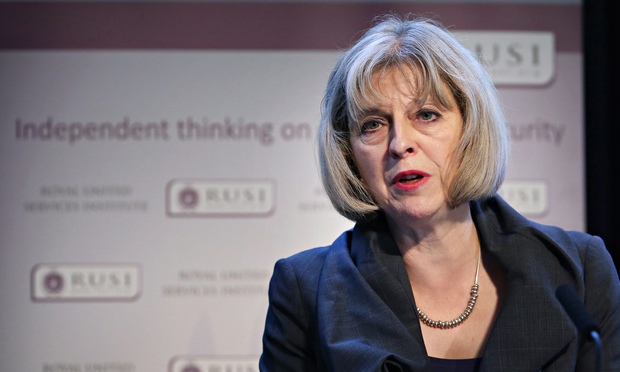 Photo credit to Peter MacDiarmid/Getty Images.
Photo credit to Peter MacDiarmid/Getty Images.
May, the daughter of a church vicar, was one of the few Tories to join Parliament in 1997, a year in which former prime minister Tony Blair swept to power under the steam of his ‘New Labour’ campaign. A ‘modernizer’ long before anyone had ever heard of Cameron, May is a full decade older than the current prime minister and she was initially known in 2002 for warning the Conservatives that they were in danger of being known primarily as the ‘nasty party.’
Her rise to one of the top state offices in 2010 was a surprise, and she promptly worked to disband some of the excesses of the Labour governments that preceded her by scrapping the national identification card and rolling back certain surveillance measures. As home secretary, she’s displayed an independent style that has, at times, frustrated Cameron. Notwithstanding the image of the Conservatives as a ‘law and order’ party, May has been ruthless in scrapping security budgets and standing up to police interests when she’s believe it necessary.
May’s drawback is that she doesn’t command an incredible amount of support among the parliamentary party, which remains something of a chummy men’s club, though the number of female Conservative MPs rose from 17 to 49 after the 2010 election. She utterly lacks Johnson’s charisma or the ease with which Cameron wears the office, and she isn’t particularly interested in banging the table on hot-button issues like immigration or Europe. The more ready comparison is not to former prime minister Margaret Thatcher, but German chancellor Angela Merkel, who has turned competent and uncharismatic into political benefits.
George Osborne
Chancellor of the exchequer
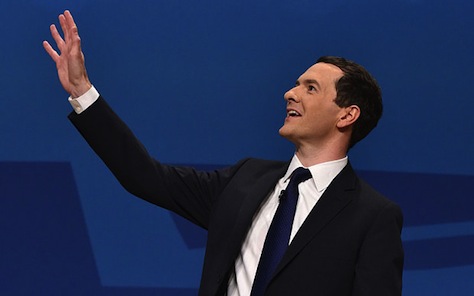 Photo credit to Julian Simmonds/The Telegraph.
Photo credit to Julian Simmonds/The Telegraph.
For a long time, Osborne and his allies, like chief whip Michael Gove, were thought to favor Johnson insofar as the London mayor is the best ‘anyone but May’ candidate.
But Cameron’s decision to include Osborne on his list of potential successors raises the profile of the British equivalent of finance minister. Throughout much of the current government, Osborne has been among the most unpopular figures, in charge of budget cuts amid a period of spotty GDP growth. Even in good times, the chancellor’s job involves say ‘no’ more than ‘yes,’ but Osborne is the face of Tory austerity. Like Johnson and Cameron, Osborne shares the Eton, Oxford and Bullingdon stamps — unlike Johnson and Cameron, he lacks their political skills.
Osborne, however, is increasingly discussed as a potential Conservative leader, and he spent much of 2014 slimming down and cutting a sharper figure. If Cameron wins a new term, Osborne might even be in a position to start spending more money as the 2010s come to a conclusion.
Sajid Javid
Secretary of state for culture, media and sport
One of the stars of the class of MPs who were first elected in 2010, it’s easy to see why a lot of people are talking about Sajid Javid as a credible successor to Cameron. He’s young (45 years old), he’s as committed to Thatcherite economic policy as anyone in the Conservative Party and the son of a Pakistani bus driver, Javid personifies the second-generation experience in the United Kingdom. If elected, he would be the country’s first non-white prime minister.
As a precocious student, he was once thrown out of the Conservative party conference for opposing Thatcher’s decision to join the exchange rate mechanism, the European currency band that served as a preliminary step to today’s eurozone. The British pound famously collapsed two years later in the ‘Black Friday’ financial crisis of 1992, after Thatcher had already been pushed out of 10 Downing Street.
A former investment banker, Javid was appointed to his first high-profile role in 2013 as financial secretary to the treasury, and since April 2014, he has served as secretary of state for culture, media and sport. If the next Tory leadership contest is closer to 2020 than to 2015, Javid could easily emerge as a very effective alternative to May, Johnson or Osborne, and he has the ability to appeal to a much wider electorate.
William Hague
former foreign secretary, former Conservative Party leader
One of the least discussed possibilities for the leadership is William Hague, who stepped down in 2014 as foreign minister.
Hague had an early and distinguished rise. Hague was elected to the House of Commons for the first time in his late 20s, and he won the Tory leadership in 1997 at age 36 after the Blair landslide against Conservative rule. Hague’s four-year tenure as leader didn’t go well, and he stepped down after losing the 2001 election.
Nevertheless, his performance as foreign minister and an informal adviser to Cameron has been praised, and he’s one of the United Kingdom’s senior statesmen. Notwithstanding his failure as Tory leader in the late 1990s, he would easily be a contender for a post-Cameron contest if he were serious about running.
Philip Hammond
foreign secretary and former defence minister
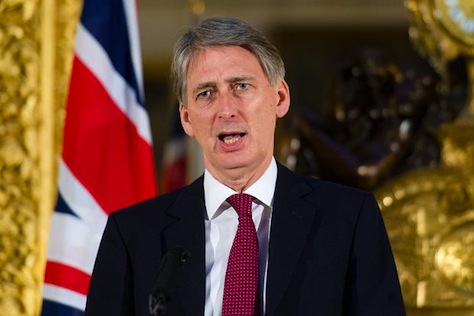 Photo credit to Leon Neal / AFP / Getty.
Photo credit to Leon Neal / AFP / Getty.
Hague’s successor at the Foreign and Commonwealth Office is Philip Hammond, a favorite of the eurosceptic right and a figure who could be viewed as a ‘safe pair’ of hands as Tory leader, given his experience in international affairs.
Hammond, however, has demurred speculation about a leadership bid, arguing that he’s ‘too old’ to run, even though he’s actually three years younger than May.
Liam Fox
Former defence secretary
Liam Fox, like Hammond, is another favorite of the Conservative right. It’s worth noting that in the 2005 leadership race, Fox overperformed expectations, winning over 25% of MPs on the second ballot, nearly overtaking right-wing challenger David Davis, who ultimately lost the leadership to Cameron in a wider vote of party members.
Though Fox resigned after just one year as defence minister, he is beloved by the Tory right — he’s hawkish, Atlanticist, eurosceptic and socially conservative (he opposed Cameron’s push to enact same-sex marriage, for example).
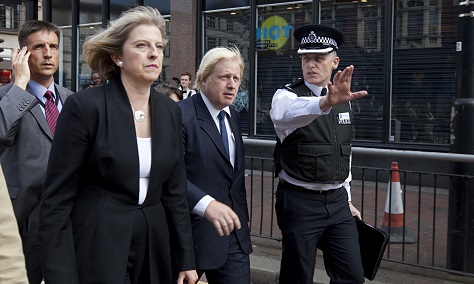
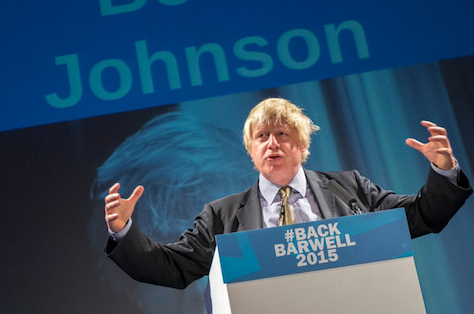
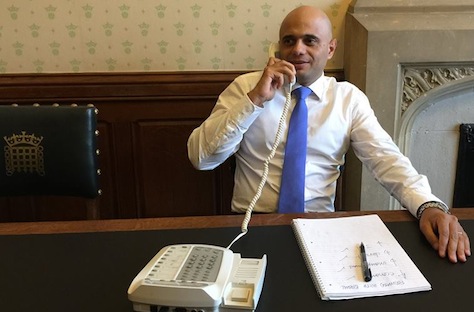
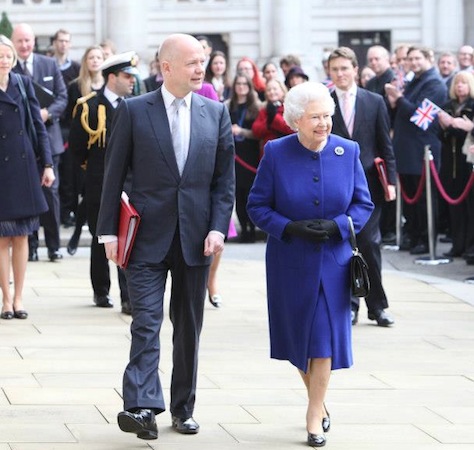
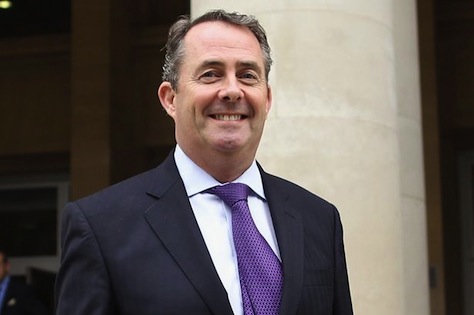
William Hague can be conclusively ruled out as Cameron’s successor: he’s had enough of politics and isn’t seeking re-election to the Commons. All the others seem fair writeups.